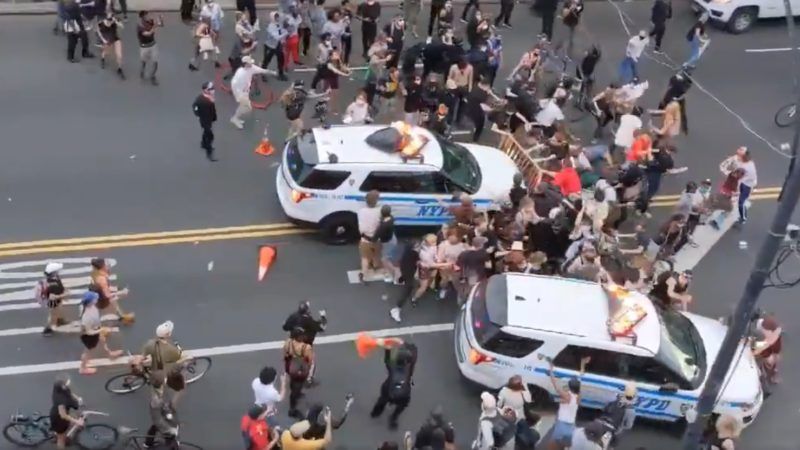George Floyd Killing Reignites Calls To Repeal New York's Police Secrecy Laws
For decades, New York's secrecy regime has hidden police misconduct records from families and reporters.

In the wake of George Floyd's death at the hands of Minneapolis police, New York civil liberties groups are again trying to roll back the state's expansive police secrecy laws.
New York has arguably the broadest police secrecy law in the country: Section 50-a of the state's civil rights statute. The law totally shields police misconduct records from release, and its scope has steadily expanded over the decades to hide wide swaths of related records from the public, including police shooting reports, transcripts of administrative trials, and even anonymized data on police use of force.
On Saturday, Democratic New York Gov. Andrew Cuomo said he would sign a bill to reform the notorious law, although he didn't go so far as to say he supported repealing it entirely.
"I would sign a bill today that reforms 50-a," Cuomo said. "I would sign it today. So the Legislature can now convene by Zoom, or however they do it, pass the bill, and I will sign it today. I can't be clearer or more direct than that."
Cuomo also said local officials could voluntarily release disciplinary records.
"I think local, elected officials across the state could release disciplinary records, even with the existing…law, if they wanted to," Cuomo said. "I think they don't want to, so they say 'I can't.' The best way to say no, as an elected official, politician, is to say 'I can't.' I don't believe that's true. I believe they can, with the law, as written."
The City reports that Democrats in the New York State Senate and State Assembly were meeting today to discuss the protests sparked by Floyd's killing, as well as legislation to address Section 50-a and police misconduct records.
For decades, the law has been a thorn in the side of civil rights organizations, investigative reporters, and families of police shooting victims. Momentum to repeal it grew following the 2014 killing of Eric Garner by New York Police Department (NYPD) officer Daniel Pantaleo, whose misconduct records became public only because they were leaked to ThinkProgress.
In 2018, BuzzFeed News obtained thousands of NYPD misconduct records through a similar leak. The resulting investigation identified 319 NYPD employees who had committed offenses serious enough to warrant firing—lying, stealing, ticket-fixing, excessive force—yet were allowed to keep their job.
The records embarrassed NYPD brass and New York City Mayor Bill de Blasio enough that the city dropped its aggressive legal stance on how the law should be interpreted. But by that time it was bound by decades of accumulated court precedent, leaving legislative reform as the only real option.
"George Floyd's tragic death has led to heartbreak and protests—but it can also lead to much-needed reforms," said Khalil A. Cumberbatch, chief strategist for New Yorkers United for Justice, in a press release. "This lack of transparency into the disciplinary process is wrong: it makes law enforcement less accountable and it makes our communities less safe."
So far all legislative efforts to change the law have failed in the face of opposition from politically powerful police unions, who argue doing so would put officers at risk of targeted attacks.
"Last night, we saw violent criminals targeting New York City police officers with bricks, brass knuckles and Molotov cocktails, for no reason other than the uniform we wear," Police Benevolent Association president Patrick Lynch said in a statement Sunday. "It is inconceivable that Governor Cuomo would want to arm those extremists with confidential police personnel records, so that they bring their weapons to our front doors."
Of course, if 50-a were repealed, law enforcement would still be afforded the same privacy protections as every other public employee in the state—judges, city council members, and teachers, for instance. What police and correctional officer unions in New York wish to preserve is their status as a special class accountable to no one but themselves.


Show Comments (15)